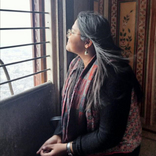For smooth Ad free experience
As the ideal student, an ardent Muslim by ancestry and committed to unity, even fighting against British leaders and standing against the partition that followed, Maulana Husain Ahmad Madani was the scholar who won't be forgotten.
Born on 6th October 1879
Belonging to the 16th generation of the Islamic prophet Muhammad through Husayn ibn Ali, Sayyid Nurul Haq was once given 24 villages by the Emperor of Delhi. The descendants of this family continued to live in their homeland for centuries, and they were one of the most prominent families during the monarchical period. Likewise, this story began.
Having been born as an Islamist, Hussain Ahmed Madani, of the village of Unnao in Uttar Pradesh, belonged to the 36th generation of this huge family tree. He completed his early education and went to Darul Uloom Deoband at the age of 13 and completed his graduation. During this period, Madani became a disciple of Rasheed Ahmad Gangohi and Mehmud Hasan, who encouraged him on the path of Sufism.
As a result of his profound spiritual lineage, he was able to benefit from both the Naqshbandi order of Sufism and the Chisti order, which are both very integral to Sunni Islam.
A few years later, Madani moved with his family to Islam's second holiest site, Medina, where he remained for 18 years. It was during this period that he taught Hadith in Prophet's Mosque. In Medina, he was well regarded for his academic abilities, and he rose to great popularity due to the unique manner of teaching he inherited from the Darul Uloom teachers. Although Madani never intended to relocate from India, he didn't want to leave his family
Amidst reports of Mehmud Hasan being arrested by Britishers involved in the Silk Letter Conspiracy, Madani became absorbed in the service of his most revered mentor. He, who hadn't even been convicted of any crime stayed with him during this period, and upon the wish of Mehmud, recited the whole Quran during the month of Ramadan. The release of Madani forced him to return to India, where he influenced a large segment of Muslims from Uttar Pradesh.
He believes religion and identity are intimately linked to one another, yet how we pass them on to the next generation is what fulfils their purpose. Not only was Madani concerned with enhancing his community while maintaining his beliefs, but he was also an advocate for bringing people together, no matter what their affiliation was. In consequence, his efforts led to the birth of the Khilafat Movement, ferocious opposition to British rule, later the two-nation theory, and the partition of India that aligned with the concept of freedom. Initially, Khilafat's cause attracted Gandhi as well, who saw it as an opportunity to rally Muslim support for nationalism.
Due to participation and engrossment in political affairs, he had to live several times for long periods in jail, where he had to bear reason ravishing tribulations and agonies for the freedom of the country.
The sacrifices he made in this period had filled the hearts and minds of the Muslims with his glory and love, as he served as a crusader. Even after the partition, most Muslims in the country kept their homes since the majority believed in Madani's vision for nationhood. In terms of comprehensiveness, his hadith teaching was considered to be different in Islam; for this reason, its glory, fame, and lure continued to encourage an increasing number of students worldwide. Likewise, in the world of Islam, Darul Uloom today bears the mark of distinction when it comes to teaching the prophetic sciences, and his benefaction to academia too is unique.
His principalship of Darul Uloom Deoband spanned 28 years, and he was a founder of Jamia Milia Islamia, New Delhi. To acknowledge his efforts and contribution to the country, he was also among the first to receive the civilian honour of Padma Bhushan in 1954.

You might be interested in reading more from
